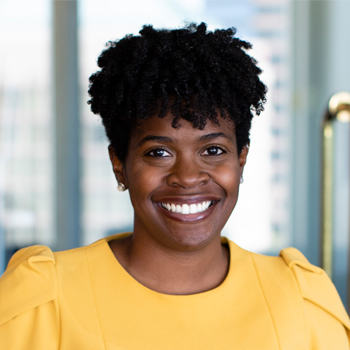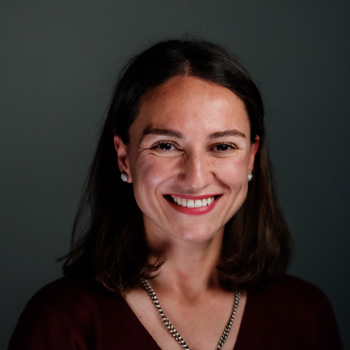Leadership Profiles
Socially Responsible Investing

Ebony Perkins, Investor and Community Relations Manager
Ebony Perkins is a dedicated, solution-oriented social entrepreneur whose heartbeat is community. She has a demonstrated ability of working with investors and philanthropists to help them make smart and strategic decisions. As Self-Help's Investor & Community Relations Manager, Ebony helps groups and individuals invest funds in a socially responsible financial institution that supports communities of all kinds, especially those underserved by conventional lenders. Before that role, she served as the Donor Relations Manager at Central Carolina Community Foundation where she managed a system to engage and educate over 400 individuals and groups to help them achieve their charitable goals.
Ebony’s commitment to community investing is evident by her service and contributions to Women In Philanthropy, Durham Center for Senior Life, and the University of North Carolina MPA Alumni Board. Ebony was also recognized on the SRI Conference's inaugural 30 Under 30 List.
Ebony holds a Master of Public Administration from the University of North Carolina at Chapel Hill and a Bachelor of Science in Marketing from Claflin University as a summa cum laude graduate. She also has an Executive Certificate in Financial Planning from Duke University.

Nuray Ozbay, Policy and Impact Investment Associate
Nuray Ozbay leads Self Help’s efforts to cultivate mission-supportive depositors and impact investors within and beyond Self-Help’s California footprint. As a global movement and relationship builder, Nuray loves working with change-makers across non-profit, corporate, and public sectors. Her expertise is in intersectional gender equality, global civil society activism, social justice, and ESG investing. Nuray currently serves as a Board Director at the UN Women San Francisco Chapter and a National Expert on Violence Against Women at the European Women’s Lobby, the largest umbrella organization of women’s associations across Europe. Before joining Self-Help, Nuray spent 11 years in the social impact sector as a researcher, consultant, and non-profit leader across Turkey and Europe, working on issues including but not limited to immigration, women’s access to economy, financial literacy & inclusion, entrepreneurship, and care economy.

Kimberly Jones, Investment Associate
Kimberly's professional career spans both the nonprofit and community development financial services sectors, with expansive senior leadership roles in arts management; business and resource development; community relations; and corporate philanthropy. Currently, she's Self-Help's Investor Relations Manager, where she helps individuals and institutions align their banking and investments with their mission, vision, and values. Kimberly has held leadership positions that advanced the missions of creative organizations and community development financial institutions seeking to make a difference in communities in their footprint. She has been a founding board member of mission driven organizations that supported the growth and development of young artists, creatives, and professionals in the nonprofit sector.
In 2015, Kimberly was selected to be a PLACES Fellow with The Funders Network, where she explored the role of philanthropy through an equity lens in low to moderate income communities. She has served as a grant/award reviewer for organizations that championed organizational excellence, community development, and environmental sustainability. Kimberly has a BA in Political Science from the University of Minnesota-Morris and an MA in Arts, Entertainment, and Media Management from Columbia College Chicago.
Green Economy; Sustainable Society; Investing for the Environment
Melissa Malkin-Weber, Sustainability Director
Melissa has worked across a broad span of hands-on sustainability practices. At Self-Help Credit Union, she integrates the triple bottom line into the organization’s financial products, operations, and buildings portfolio. She led Self-Help to realize over $1.7 million in net present value from initiatives in this sector, including $180,000 energy savings in our own operations. Melissa previously directed the residential energy efficiency and indoor air quality research program at Advanced Energy and worked in industrial pollution prevention at RTI International. She earned her law degree from University of Michigan, and her Master's from UNC’s School of Public Health.
Shondra Tanner, Mortgage Lending
Shondra Owens Tanner brings her extensive experience and commitment to making mortgage loans for low-wealth families to her position as Self-Help's Director of Mortgage Originations, where she oversees all North Carolina home loan origination and new business development. Shondra's areas of expertise includes buying your first home, mortgage basics (documentation, closing costs, down payments), delinquency and loss mitigation (What is a forbearance and loan modification and what does that do to your credit?)